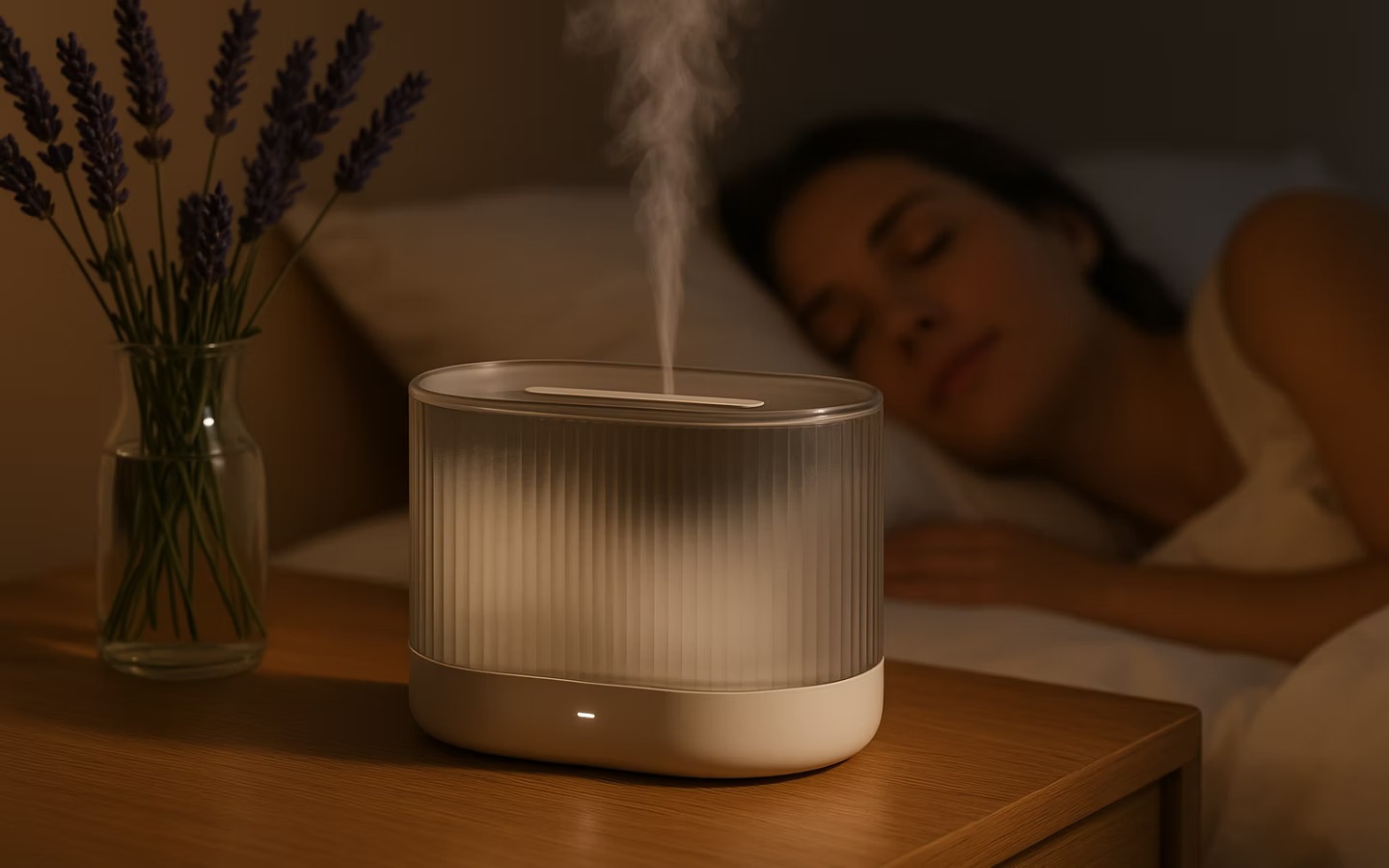October 26, 2025
How to Fix Your Sleep Schedule and Get Better Rest Each Night
We've all been there - staying up late to meet a deadline, then sleeping in the next day. Then the weekend comes, and we binge-watch our new favorite show on Netflix until 2 a.m. or end up scrolling through TikTok on our phones for 30–60 minutes.
If it happens occasionally, you might be able to recover without noticing significant changes in your sleep patterns. However, if this behavior becomes habitual, leading to an irregular sleep schedule, it can result in more serious issues beyond the typical morning grogginess.
This article explains why a consistent sleep schedule matters, how to fix it step by step, and what tools can help you achieve better sleep quality long-term.
Sleep Schedule Affects More Than Just Sleep
The human body runs on a 24-hour cycle called the circadian rhythm, which regulates sleep-wake timing.
Imbalanced or irregular sleep schedule happens when your usual sleep and wake times change too often, and the circadian rhythm gets disrupted as a result. This is often experienced as difficulty falling asleep, fragmented sleep, or morning grogginess.
Irregular sleep schedules have been linked to higher blood pressure, insulin resistance, and a greater risk of metabolic and heart problems. Studies have also shown that sleep regularity is more important for long-term health than sleep duration alone.
A regular sleep schedule contributes to:
- Better cognitive function, including better memory and focus
- More balanced mood and emotional regulation
- Fewer cravings and easier weight management
- Reduced risk of chronic conditions like diabetes and hypertension
One recent study even found that imbalanced sleep patterns are linked to a higher mortality risk (13-34%), regardless of total hours slept.
In short, getting your sleep schedule back on track is one of the most effective ways to improve your health, energy, and focus.

How to Fix Your Sleep Schedule And Improve Sleep Quality
A balanced sleep schedule comes down to three things:
- a set wake-up time,
- a set bedtime,
- and enough hours of rest in between.
The body will naturally adjust to a new sleep schedule, but it still takes patient planning and consistency.
1. Start with your wake-up time
Your wake-up time is what sets the tone for your internal clock. Even if you're trying to fall asleep earlier, it's more effective to first set a consistent wake-up time that you can follow each day. Pick a time you can realistically stick to and that fits your morning routine (work, school), including weekends.
Avoid the temptation to sleep in or deviate from your new sleep schedule.
If you are a heavy sleeper, consider using an alarm clock to wake up on time. Once your wake-up time is established, your body will naturally adapt to the new schedule, which can last a few days to a week.
2. Then set your bedtime
Most adults need somewhere between 7 and 9 hours of sleep. Once you've decided on your wake-up time, count backwards to find your ideal bedtime. If you want to wake at 7 a.m., for example, aim to be in bed by 10:30 p.m. or 11 at the latest, factoring in some wind-down time.
If you are not used to going to bed this early, you might take more time than usual to fall asleep at first. Don’t get discouraged. After a few days, your body will adjust and start to expect sleep at this time.
3. Adjust to your new sleep schedule gradually
If your current sleep schedule is far from where you want it to be, don’t try to fix it all in one night.
Moving your sleep time by just 15 to 30 minutes every few days is more easily done, and by doing this, you are not adding more stress and anxiety – which naturally helps improve sleep quality over time.
4. Get enough natural light in the morning
Light exposure first thing in the morning helps reset your internal clock by stopping the production of melatonin. Try to get at least 15 to 30 minutes of sunlight as soon as you wake up, even if it's cloudy. If natural light is not an option, a light therapy lamp can be helpful during darker months especially.
5. Avoid naps, or keep them short
It's normal to feel a bit off when you are fixing your sleep schedule. But if you nap during the day, especially in the afternoon, it can make it harder to fall asleep later at night. If you really need a nap, the general rule of thumb is to keep it under 20 minutes and before 2 p.m.
[CTA_INSERT]
Keeping Your Sleep Schedule Consistent
Consistent sleep schedule is one of the best ways to keep your circadian rhythm stable and maintain good sleep quality. It might feel like a sacrifice at first, especially if you're used to staying up late and sleeping in on days off. But, the more predictable your sleep timing becomes, the easier it gets to fall asleep naturally and wake up restored.
If you travel often
Try to keep meals, light exposure, and sleep times close to your home schedule for short trips. For longer ones, adjust your routine by one hour per day leading up to your departure.
Once you arrive, get enough daylight in the new time zone and avoid bright screens late at night.
If you work shifts
Use blackout curtains or a sleep mask to mimic night during your rest period. Limit caffeine to the first half of your shift and schedule short naps before work if needed. On days off, maintain this schedule instead of returning completely to daytime hours.
If you’re a parent or caregiver
Rest when your schedule allows and create a short, reliable routine before each sleep period. Even if sleep comes in blocks, your body will benefit from repetition. Once your nights become more predictable, keep those cues in place to help re-establish your rhythm.
If stress keeps you awake
Focus on relaxing yourself before bed rather than forcing sleep with pills. Techniques like slow breathing, mindfulness, or journaling can help reduce mental stimulation and help you fall asleep faster.
Treat your wind-down routine as a non-negotiable, even if the rest of your day changes.
How a Wind-Down Routine Supports Regular Sleep Schedule
A wind-down routine is any activity or set of activities that helps you transition out of the day and into rest. This can be done in the 30 to 60 minutes before bed where you intentionally slow down, disconnect from screens, and leave behind the mental noise of the day.
A sleeping environment can support or prevent you from sleeping. Keep your room cool and dark, and turn off bright lights in the evening and use softer and warmer light instead.
Electronic devices such as phones, laptops, and tablets should be put away in another room at least 30 minutes before bed. You can read, stretch, journal, or listen to calming music. Use pink or white noise if you need to block any background noise that can wake you up during the night.
To use scents to help you sleep, consider personal scent therapy with Kimba.

How Kimba Can Help You Sleep Better
Real rest depends on how calm and safe your body feels during the night.
Kimba was designed to support that directly. It uses scent to reach the limbic region of the brain, where emotion and stress are processed. When your wearable shows signs of restlessness or tension, Kimba releases a pulse of scent that helps your body relax and drift back into deeper sleep.
Each night, Kimba learns your sleep patterns and adapts its timing for better results.
Over time, your brain begins to associate these scent cues with calm, making it easier to fall asleep, stay asleep, and wake up clear-headed. Kimba is non-habit forming, hormone-free, and designed to support your body’s natural rhythm and can help you fix your sleep schedule for good.
With Kimba, you can build the conditions for better and more restorative sleep – without pills or side effects.
Join our waitlist and find out what Kimba can do for your nights!


Continue reading

Parasomnias and Why Sleep Becomes Unstable at Night

What is REM Sleep And How to Increase It Naturally


